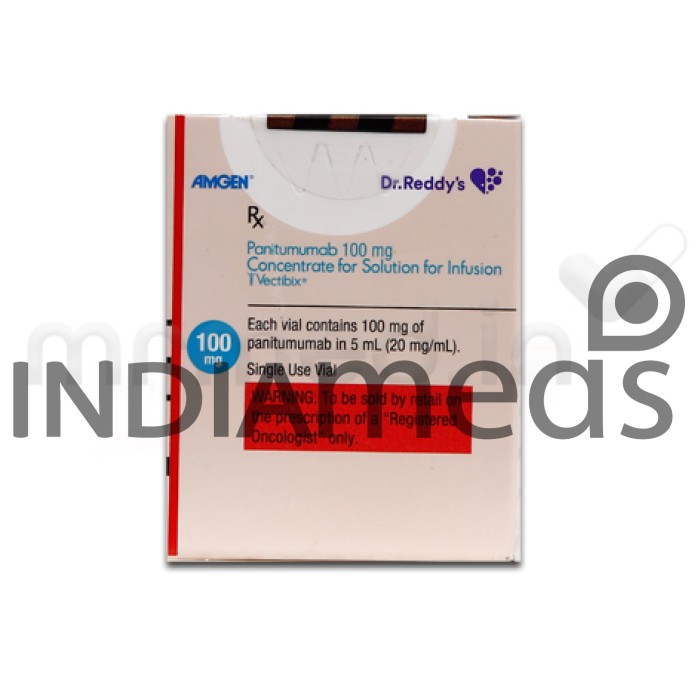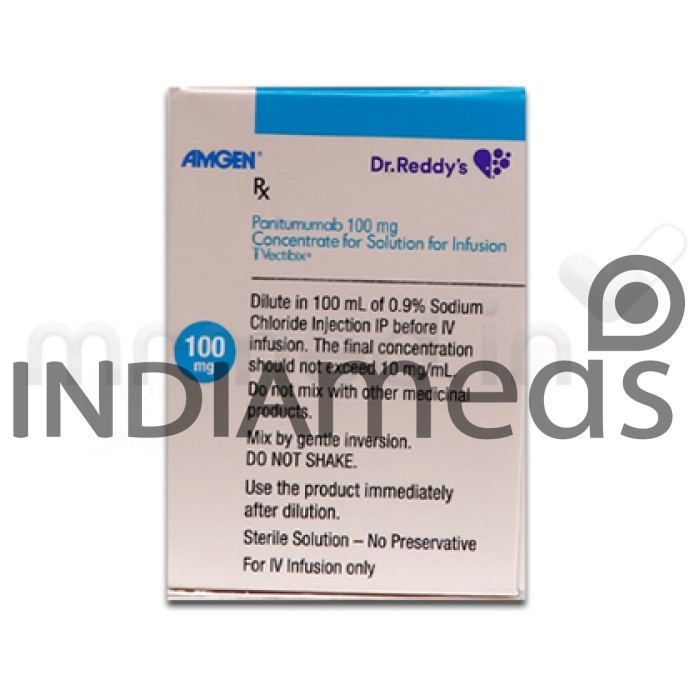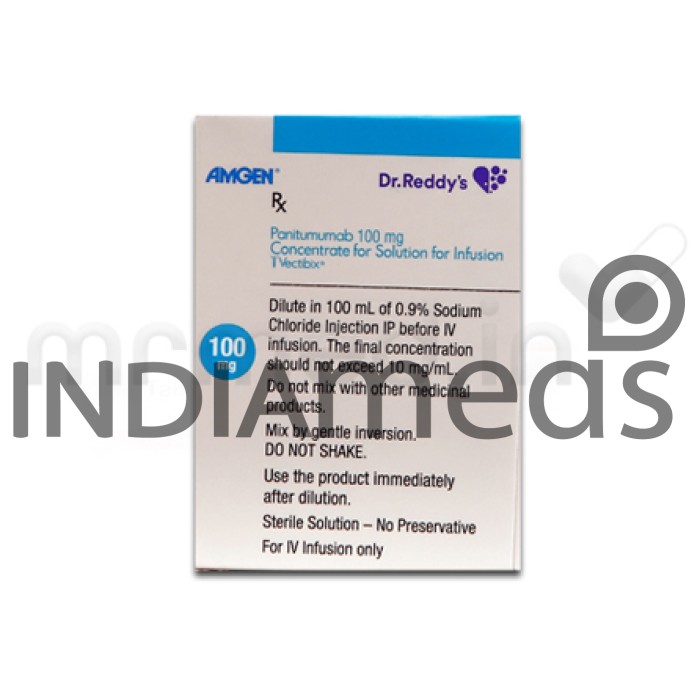Vectibix 100mg injection is an anticancer drug belonging to the class of epidermal growth factor receptor (EGFR) inhibitors, containing the active ingredient Panitumumab. It is used to treat metastatic colorectal cancer (cancer that begins in the colon or rectum and has spread to other parts of the body).
It is not recommended to take this injection if you are allergic to any of its ingredients. This drug targets certain proteins in the body, which can increase the risk of bleeding. If you experience any signs of bleeding while taking this drug, such as unusual bleeding or bruising, black or tarry stools, blood in the urine, or bleeding gums, you should contact your doctor immediately. Your doctor may need to adjust your dose or temporarily stop the treatment. Eye problems can occur while on the treatment with this medicine such as inflammation and damage to the cornea, and the symptoms may include eye pain, redness, blurred vision, and sensitivity to light.
It is important to tell your doctor if you experience any skin problems while taking this medicine. Your doctor may recommend topical creams or ointments to soothe the skin or antibiotics to treat any infections that may develop. Infusion reactions can happen as a side effect of this drug, which are allergic reactions that can occur during or shortly after the infusion of the medication. To minimize the risk of infusion reactions, your doctor will monitor you closely during and after the infusion and may give you medications such as antihistamines and corticosteroids to prevent or treat any allergic reactions that may occur. Vectibix 100mg injection is not recommended during pregnancy as it causes harm to the unborn baby. Tell your healthcare provider before beginning this treatment if you are pregnant or planning to have a baby. It is advised for both men and women to follow proper contraceptive methods during and for 3 months after the last dose of the drug.
Therapeutic Effects of Vectibix 100mg Injection
Pregnancy
Vectibix 100mg injection is not recommended for pregnant women as it may cause fetal harm. Consult your doctor if you are pregnant or planning for pregnancy during the treatment.
Breast Feeding
It is unknown whether Vectibix 100mg injection is safe during breastfeeding. Do not breastfeed without consulting your doctor.
Lungs
It is not known whether Vectibix 100mg injection can be administered to patients with lung problems. Consult your doctor if you have any lung diseases before starting the treatment.
Liver
It is unknown whether Vectibix 100mg injection can be given to patients with liver diseases. Inform your doctor if you have any liver problems.
Alcohol
Consuming alcohol may affect the effectiveness of Vectibix 100mg injection. Stop consuming alcohol if you are taking this medicine.
Driving
It is unsafe to drive vehicles or operate heavy machinery after taking Vectibix 100mg injection, it may cause dizziness and impair your concentration.
Serious
- Acute Kidney failure
- Severe skin reactions
- Infusion-related reactions
- Swelling
- Severe diarrhea when used in combination treatment
- Lung problems
- Electrolyte imbalances
- Sensitivity to light
- Skin and eye disorders
- Dizziness
- Anxiety
Common
- Anaemia
- Sleeplessness
- Decreased appetite
- Diarrhea, nausea, vomiting, or constipation
- Stomach pain
- Dry mouth
- Heartburn
- Tiredness
- Fever
- Headache
- Hair loss
- Back pain
Vectibix 100mg injection may cause harm to an unborn baby. Tell your healthcare provider before beginning this treatment if you are pregnant or planning to have a baby.
Vectibix 100mg injection is associated with increased risk of bleeding complications and poor wound healing. Hence it is suggested to avoid planning for surgery and tell your physician before you undergo surgery or dental procedures. Your healthcare provider will suggest stopping the medication a day prior to surgical procedure.
Vectibix 100mg injection may weaken your immune system, and taking live vaccines may increase the risk of infection. You should avoid getting live vaccines while using this drug.
Yes, severe skin problems, including a rash, can occur with the use of Vectibix 100mg injection, and it's important to note that skin reactions, including an acneiform rash, are common with this drug use, this may lead to widespread infection and potentially be life-threatening. If you notice any signs of a severe skin reaction, such as a rash, blisters, or peeling skin, contact your doctor immediately or seek emergency medical attention.
Vectibix 100mg injection is contraindicated in individuals who have a history of severe allergic reactions to this drug or any of its components. It is also contraindicated in individuals with a history of severe infusion reactions or hypersensitivity reactions to other monoclonal antibodies.
Molecule name: Panitumumab | Therapeutic class: Anticancer |
Pharmacological class: Epidermal growth factor receptor (EGFR) inhibitors | Indications: Metastatic colorectal cancer |







